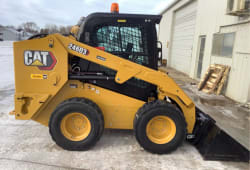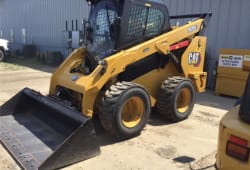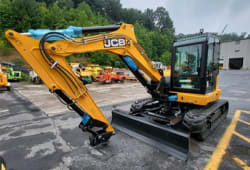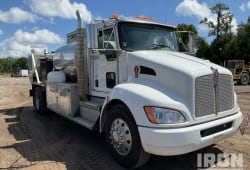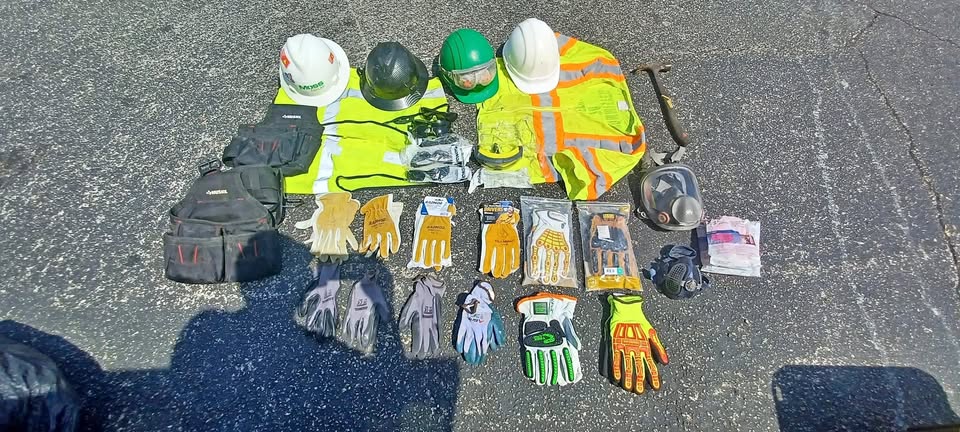Marketing Certified & Inspected Used Heavy Equipment for Quality Assurance
13 Lectura mínima
)
agosto 11, 2023
In the world of heavy equipment trade, quality assurance plays a vital role in ensuring customer satisfaction, safety, and efficiency. Buyers and sellers alike understand the importance of purchasing or offering certified and inspected used heavy equipment to meet their construction and industrial needs.
Understanding the Importance of Quality Assurance in Heavy Equipment Trade
When it comes to heavy equipment, quality assurance goes beyond mere satisfaction. It ensures that the equipment functions optimally meets safety standards, and reduces the risk of accidents or breakdowns. Moreover, it gives buyers the confidence that they are investing in a reliable piece of machinery that will perform well over a long period.
Heavy equipment plays a crucial role in industries such as construction, mining, and various other sectors. These industries rely heavily on the efficiency and reliability of heavy machinery to carry out their operations smoothly. The importance of quality assurance in the heavy equipment trade cannot be overstated, as it is the key to ensuring customer satisfaction, safety, and efficiency.
The Role of Quality Assurance in Customer Satisfaction
A satisfied customer is more likely to become a loyal customer. Quality assurance guarantees that the equipment meets the desired specifications and performs as expected. This, in turn, leads to enhanced customer satisfaction. Buyers can rest assured knowing that they have made a worthwhile investment that aligns with their requirements.
Imagine a construction company looking to purchase a new excavator for their projects. They want a machine that can handle heavy loads, has precise controls, and is built to withstand harsh working conditions. With quality assurance, the company can be confident that the excavator they choose will meet their expectations and deliver the desired results. This level of customer satisfaction not only strengthens the relationship between the buyer and the equipment supplier but also enhances the company's reputation in the industry.
Ensuring Safety and Efficiency through Quality Assurance
Heavy equipment is meant to handle demanding tasks in construction, mining, and various other industries. The last thing anyone wants is a piece of equipment that compromises safety or causes delays due to frequent breakdowns. Quality assurance ensures that the equipment meets safety standards and is in optimal operating condition, guaranteeing both safety and efficiency.
For example, in the mining industry, where heavy machinery operates in challenging environments, safety is of utmost importance. Quality assurance processes ensure that mining equipment is thoroughly tested and inspected to meet stringent safety regulations. This not only protects the operators and workers but also minimizes the risk of accidents and potential legal liabilities for the mining company.
Efficiency is another crucial aspect of heavy equipment. Construction projects often have tight schedules, and any equipment breakdown can lead to costly delays. Through quality assurance, equipment suppliers can identify and rectify any potential issues before the equipment is delivered to the customer. This proactive approach saves time, money, and resources for both the buyer and the supplier.
Moreover, quality assurance also includes regular maintenance and servicing of heavy equipment. This preventive approach helps identify any wear and tear, allowing for timely repairs and replacements. By ensuring that the equipment is always in optimal condition, quality assurance contributes to its longevity and overall performance.
In conclusion, quality assurance plays a vital role in the heavy equipment trade. It not only enhances customer satisfaction but also ensures safety and efficiency in industries that heavily rely on heavy machinery. By investing in quality assurance processes, equipment suppliers can provide reliable and durable equipment, building trust with their customers and contributing to the success of various sectors.
The Process of Certification and Inspection of Used Heavy Equipment
Before used heavy equipment can be marketed as certified and inspected, it goes through a rigorous process to ensure its reliability and performance. This process consists of two key elements: comprehensive equipment inspection and certification.
Key Elements of a Comprehensive Equipment Inspection
During the inspection, every aspect of the equipment is thoroughly examined to identify any faults or deficiencies. This includes checking the engine, hydraulics, electrical systems, brakes, and structural integrity. Additionally, fluid samples may be taken and analyzed, and any necessary repairs or maintenance are carried out to bring the equipment up to the required standards.
Inspectors meticulously inspect the engine, examining its components and assessing its performance. They check for any signs of wear and tear, leaks, or malfunctioning parts. The hydraulics are tested to ensure they are functioning properly, with no leaks or pressure issues. The electrical systems are carefully examined, including the wiring, switches, and controls, to ensure they are in good working condition.
Brakes play a crucial role in heavy equipment safety, so they are given special attention during the inspection process. Inspectors check the brake pads, rotors, and hydraulic systems, ensuring they are in optimal condition and capable of providing reliable stopping power. The structural integrity of the equipment is also carefully assessed, looking for any signs of damage, cracks, or weakened areas that could compromise its performance or safety.
As part of the comprehensive inspection, fluid samples may be taken from various components of the equipment. These samples are then analyzed in a laboratory to detect any contaminants, signs of wear, or other issues that could indicate potential problems. If any issues are identified, the necessary repairs or maintenance are carried out to address them and bring the equipment up to the required standards.
The Role of Certification in Establishing Equipment Reliability
Certification is the final step in the process, indicating that the equipment has successfully passed the inspection and meets the necessary criteria. It serves as proof that the equipment is reliable, well-maintained, and ready for use. Certification also reassures potential buyers that they are investing in equipment that has met the industry's highest standards.
During the certification process, the inspection results are carefully reviewed and verified. Any repairs or maintenance performed during the inspection are documented, along with the date and details of the work carried out. This documentation provides a transparent record of the equipment's condition and the steps taken to ensure its reliability.
Once the inspection results and documentation are reviewed and approved, the equipment is issued a certification. This certification may come in the form of a physical document or a digital certificate, depending on the industry standards and practices. The certification serves as a mark of quality and reliability, indicating that the equipment has met the requirements and is ready to be used in various applications.
Furthermore, the certification process involves periodic audits and re-inspections to ensure ongoing compliance with the required standards. This helps maintain the equipment's reliability and ensures that it continues to meet the industry's expectations throughout its service life.
For buyers, the certification provides peace of mind, knowing that they are investing in equipment that has undergone a thorough inspection and meets the necessary criteria for reliability and performance. It also helps them make informed decisions by providing them with a standardized measure of equipment quality.
In conclusion, the process of certification and inspection of used heavy equipment involves a comprehensive examination of every aspect of the equipment, from its engine to its structural integrity. The certification serves as proof that the equipment has met the necessary standards and is ready for use, providing reassurance to potential buyers. Regular audits and re-inspections ensure ongoing compliance, maintaining the equipment's reliability throughout its service life.
Marketing Strategies for Certified and Inspected Used Heavy Equipment
Once heavy equipment has been certified and inspected, effective marketing strategies can help sellers maximize their reach and attract potential buyers.
When it comes to selling certified and inspected used heavy equipment, it is essential to leverage the certification and inspection processes in marketing efforts. These processes offer valuable selling points that can help sellers stand out from the competition.
Leveraging Certification and Inspection in Marketing
The certification and inspection processes are not just formalities; they provide tangible benefits that sellers can emphasize in their marketing campaigns. By showcasing the reliability, performance, and safety of the certified and inspected equipment, sellers can instill confidence in potential buyers.
Buyers are often concerned about the condition of used heavy equipment, and the certification and inspection processes address these concerns. Sellers can highlight how their equipment has been thoroughly assessed and certified, reassuring buyers that they are making a wise investment.
Moreover, emphasizing certification and inspection can set the equipment apart from non-certified options. Buyers are more likely to choose equipment that has undergone a rigorous evaluation process, as it signifies a higher level of quality and reliability.
Effective Marketing Channels for Used Heavy Equipment
Choosing the right marketing channels is crucial when it comes to promoting certified and inspected used heavy equipment. By selecting the most effective platforms, sellers can reach a wide audience of potential buyers.
Online marketplaces are a popular choice for selling used heavy equipment. Platforms such as MachineryTrader, Equipment Trader, and eBay offer a vast reach and attract buyers from various industries. These platforms allow sellers to create detailed listings, including information about the certification and inspection processes, to attract potential buyers.
In addition to online marketplaces, industry-specific platforms can also be highly effective. These platforms cater specifically to the heavy equipment industry and attract buyers who are actively looking for equipment. By listing equipment on these platforms, sellers can target a more focused audience, increasing the chances of finding interested buyers.
Another effective marketing channel for certified and inspected used heavy equipment is auctions. Auctions provide a competitive environment where buyers actively bid on equipment. Sellers can highlight the certification and inspection in their auction listings, attracting buyers who value the reassurance of a thorough evaluation process.
Furthermore, targeted advertising through trade publications can help sellers connect directly with interested parties. Many trade publications have a dedicated section for used heavy equipment, allowing sellers to showcase their certified and inspected equipment to a targeted audience.
Attending trade shows is another effective way to market certified and inspected used heavy equipment. These events bring together industry professionals and potential buyers, providing sellers with an opportunity to showcase their equipment in person. By highlighting the certification and inspection, sellers can attract attention and generate leads.
In conclusion, marketing certified and inspected used heavy equipment requires leveraging the benefits of the certification and inspection processes and choosing the right marketing channels. By emphasizing the reliability, performance, and safety of the equipment, sellers can instill confidence in potential buyers. Additionally, utilizing online marketplaces, industry-specific platforms, auctions, targeted advertising, and trade shows can help sellers reach a wide audience and connect with interested buyers.
Case Studies: Successful Marketing of Certified and Inspected Used Heavy Equipment
Case Study 1: How Company A Boosted Sales with Quality Assurance
Company A, a leading heavy equipment seller, implemented a quality assurance program that included comprehensive equipment inspection and certification. By marketing their certified and inspected equipment aggressively, they were able to attract more customers and achieve a significant increase in sales. The company's commitment to quality assurance and customer satisfaction became its unique selling proposition.
One of the key factors that contributed to Company A's success was its rigorous inspection process. Their team of experienced technicians meticulously examined each piece of equipment, ensuring that it met the highest standards of quality and functionality. This attention to detail gave customers peace of mind and instilled confidence in their purchase decisions.
In addition to their thorough inspections, Company A also offered a comprehensive certification program. This program involved conducting in-depth tests and assessments to verify the equipment's performance and reliability. The certification process included checking the engine's efficiency, testing the hydraulic systems, and inspecting the structural integrity of the equipment. By providing customers with a certified seal of approval, Company A was able to differentiate itself from competitors and attract buyers who valued quality and reliability.
Company A's marketing strategy played a crucial role in its success as well. They invested in targeted advertising campaigns that highlighted the benefits of purchasing certified and inspected equipment. Through various channels such as print media, online platforms, and industry trade shows, they effectively communicated the value proposition of their products. By emphasizing the peace of mind and long-term cost savings that came with their certified equipment, Company A was able to capture the attention of potential buyers and persuade them to choose their products over competitors.
Case Study 2: Company B's Success with Online Marketing Strategies
Company B specialized in selling certified and inspected used heavy equipment exclusively online. By leveraging targeted online advertising and utilizing popular online marketplaces, they quickly gained a reputation for offering reliable equipment. Their success resulted in increased market share and a loyal customer base obtained through their transparent and trustworthy online marketing strategies.
One of the key advantages of Company B's online marketing approach was the convenience it offered to customers. By providing a user-friendly website with detailed product descriptions, high-resolution images, and virtual tours of the equipment, they made the buying process seamless and efficient. Potential buyers could browse through their inventory from the comfort of their own homes, compare different models, and make informed decisions without the need for physical visits.
In addition to its user-friendly website, Company B also invested in targeted online advertising. They utilized search engine optimization techniques to ensure their website appeared prominently in relevant search results. They also ran targeted ads on popular heavy equipment industry websites and utilized social media platforms to reach a wider audience. By strategically placing its ads where potential buyers were likely to be, Company B was able to generate a steady stream of qualified leads and drive traffic to its website.
Transparency was another key element of Company B's online marketing strategy. They provided customers with comprehensive information about each piece of equipment, including its inspection and certification reports. This transparency helped build trust with potential buyers, as they could see the detailed history and condition of the equipment before making a purchase. Company B also encouraged customer reviews and testimonials, further enhancing its reputation for reliability and customer satisfaction.
In conclusion, both Company A and Company B successfully marketed their certified and inspected used heavy equipment by implementing effective strategies tailored to their unique business models. Company A's focus on quality assurance and customer satisfaction, combined with their aggressive marketing efforts, allowed them to attract a larger customer base and increase sales. Meanwhile, Company B's online marketing strategies, including targeted advertising and transparent information sharing, helped them establish a strong online presence and gain a loyal customer following. These case studies highlight the importance of quality assurance, effective marketing, and customer-centric approaches in the successful marketing of certified and inspected used heavy equipment.
Future Trends in the Used Heavy Equipment Market
The used heavy equipment market is constantly evolving, and sellers must stay ahead of the curve to remain competitive.
The Impact of Technology on Equipment Inspection and Certification
Advancements in technology are transforming the way equipment is inspected and certified. Tools such as drones, digital data analysis, and remote monitoring enable faster and more accurate inspections, reducing downtime and increasing efficiency. Sellers who embrace these technological advancements can enhance their certification processes and stay at the forefront of the market.
Predicted Market Trends and Their Implications for Sellers
As the construction and industrial sectors continue to grow, the demand for used heavy equipment is expected to rise. Sellers who focus on quality assurance, sustainable practices, and value-added services are likely to gain a competitive edge in the market. Additionally, the shift towards eco-friendly equipment and the rise of online marketplaces will shape the future of the used heavy equipment industry.
In conclusion, marketing certified and inspected used heavy equipment requires a deep understanding of the importance of quality assurance, the process of inspection and certification, effective marketing strategies, and staying abreast of future trends. By focusing on these aspects, sellers can build trust, attract customers, and thrive in a dynamic and evolving market.

Caleb Woods is an experienced content specialist and an editor at Boom & Bucket, blending his journalism background with expertise in the heavy equipment industry. He delivers engaging, informative content to help professionals stay informed and make smarter decisions in the machinery market.



